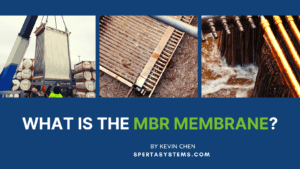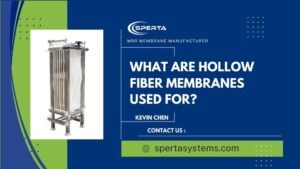Wastewater treatment constantly evolves, especially with our growing environmental awareness and tighter rules. Everyone’s looking for better ways to clean wastewater without wasting too much energy or resources. That’s where the MBR, short for Membrane Bioreactor, comes into play. It is making wastewater treatment more efficient.
So, how efficient is MBR treatment? In short, MBR offers a high level of efficiency, producing top-quality effluent while using less space and energy compared to traditional methods.
As we delve deeper into MBR, it’s essential to understand its workings, advantages, and the factors that influence its efficiency.
What is MBR?
MBR stands for Membrane Bioreactor. It’s a process that combines conventional biological wastewater treatment with membrane filtration. Instead of relying on gravity to separate solids from the treated water, MBR uses a membrane, ensuring the water is free from suspended particles and microorganisms.
How Do We Measure MBR’s Efficiency?
Efficiency in wastewater treatment can be gauged by looking at several parameters:
- Quality of the treated water.
- Amount of sludge produced.
- Energy consumption.
- Operational costs.
When compared to traditional methods, MBR often scores high on these parameters.
What Makes MBR So Efficient?
Several factors contribute to the high efficiency of MBR:
- High-quality effluent: The membrane filtration ensures that the treated water is high quality, often suitable for reuse.
- Flexibility: MBR systems can handle varying wastewater conditions, making them suitable for different applications.
- Reduced sludge production: With MBR, there’s less sludge to dispose of, leading to cost savings.
Are There Factors That Can Affect MBR’s Efficiency?
Like any system, MBR‘s efficiency can be influenced by several factors:
- Membrane fouling: Over time, the membrane can get clogged, reducing its efficiency. Regular cleaning can mitigate this.
- Operational conditions: Flow rate and temperature can impact the system’s efficiency.
- Maintenance: Proper maintenance is crucial to ensure the system operates optimally.
How Does MBR Compare to Traditional Methods?
| Parameter | MBR | Traditional Methods |
|---|---|---|
| Water Quality | High | Moderate |
| Sludge Production | Low | High |
| Energy Consumption | Moderate | High |
| Operational Costs | Moderate | High |
As seen in the table, MBR offers several advantages over traditional methods, especially regarding water quality and sludge production.
Are There Any Challenges or Limitations?
While MBR is highly efficient, it has its challenges. The initial investment can be high, and the membranes need regular maintenance to prevent fouling. However, the long-term benefits often outweigh these challenges.
Conclusion
MBR presents a promising solution in the world of wastewater treatment. Its high efficiency, combined with the production of top-quality effluent, makes it a preferred choice for many. However, like any system, its efficiency depends on proper operation and maintenance.
The above is information about the effectiveness of MBR membranes. If you still have questions about the membrane bioreactor or need to purchase MBR membranes, don’t hesitate to contact SPERTA.
Shanghai SPERTA Environmental Technology Co., Ltd. has specialized in producing water treatment products for many years. The company has the core technology of producing MBR membrane components. It has a high production capacity, aiming to build a high-quality brand of MBR production and sales all over the world. If you have any needs, please feel free to contact us.









